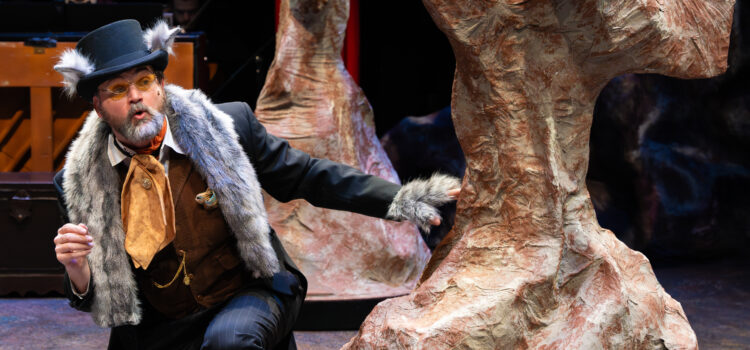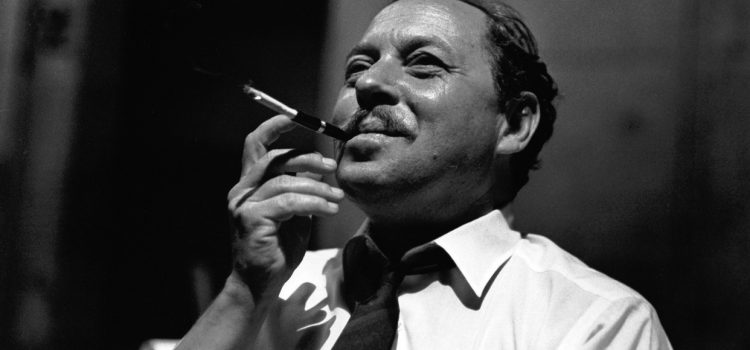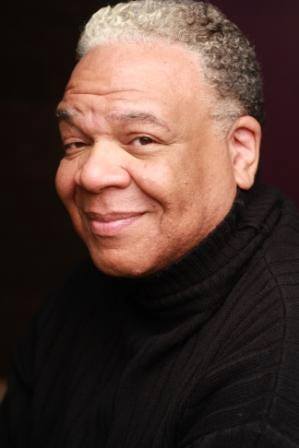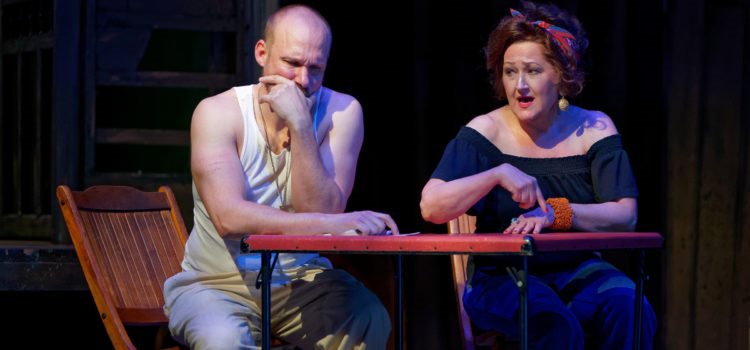By Lynn Venhaus
In an extraordinary, reimagined interpretation of Stephen Sondheim’s classic “Into the Woods,” New Jewish Theatre immerses us into a vibrant in-the-round setting, where a vocal-rich ensemble of 11 takes on iconic fairy tale characters.
The harmonies stand out under the seamless music direction of Larry D. Pry, who also serves as the Narrator and expertly plays the piano while Christopher Bachmann is on cello and Helen Bednara is on bassoon. While only three, the virtuosos are a superb combination that elevates this show’s rich melodies.
To say they understand Sondheim is no small feat. The greatest theater artist of the past 75 years is demanding, but everyone connected with this production is up for that daunting challenge. To be able to master his complex harmonies is like winning a gold medal in the Olympic Decathlon.
This 1986 masterpiece was Sondheim’s second collaboration with book writer James Lapine after “Sunday in the Park with George” two years earlier. They both won 1988 Tony Awards for score and book, even though “The Phantom of the Opera” took home the Best Musical prize. (But it later won 2002 Tony for Best Revival, 2011 Laurence Olivier Award for Best Revival and last year’s cast won a Grammy Award for Best Musical Theater Album.)
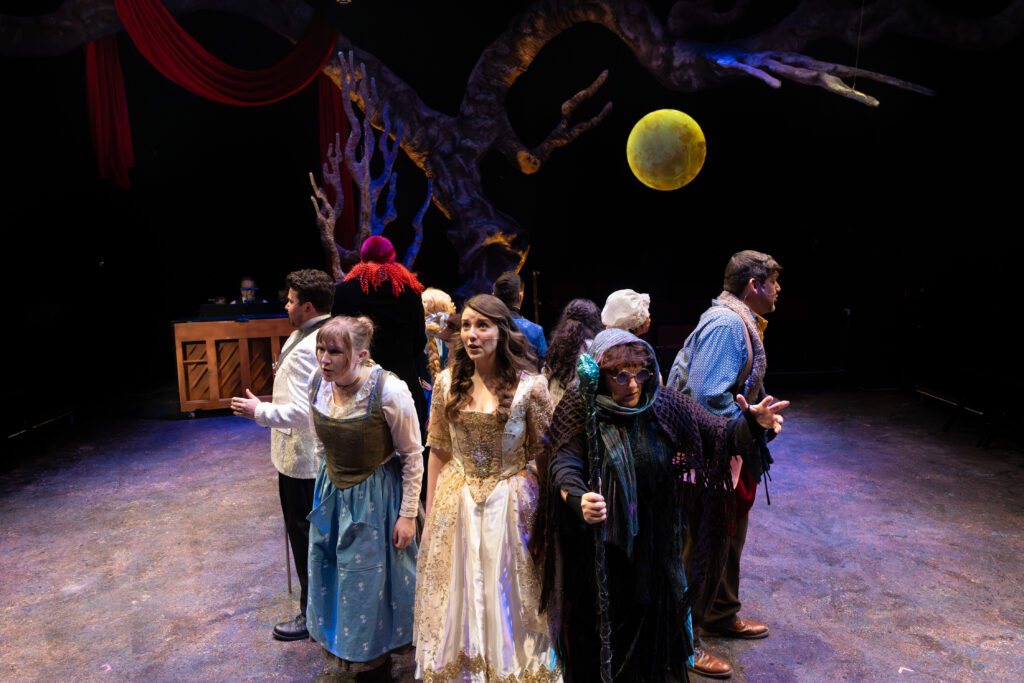
When done right, “Into the Woods” can be magical, transformative in many ways (as I experienced in the 2022 Broadway revival and a whimsical, inventive interpretation at Stray Dog Theatre last spring).
The fact that this musical continues to speak to new generations and evolves with new insights nearly three decades later is a testament to its relatable themes reflecting on humanity.
The concept is deceptively simple – a storybook world but with real-people problems, and how these characters’ lives are uprooted, teaching them valuable lessons about life, love, and listening. How they need to really be present when together – meaning it, not just saying so.
This poignant New Jewish Theatre effort focused on the emotional layers of each character, who are desperate for happily ever after but not making the effort to change their ways until confronted with reality.
Every time I see this show, I am struck by new observations and how the tale has deepened over time, but it is reinforced that I am not alone when people leave me halfway through the wood.
And this much is true — I always will be misty-eyed during a few numbers, “No One Is Alone” and “Children Will Listen” specifically, and in this show, “No More” especially resonated.
Here, the biggest takeaway is what comes after the “happily ever after” when you want so badly to have your wishes come true but realize you can’t do it alone.
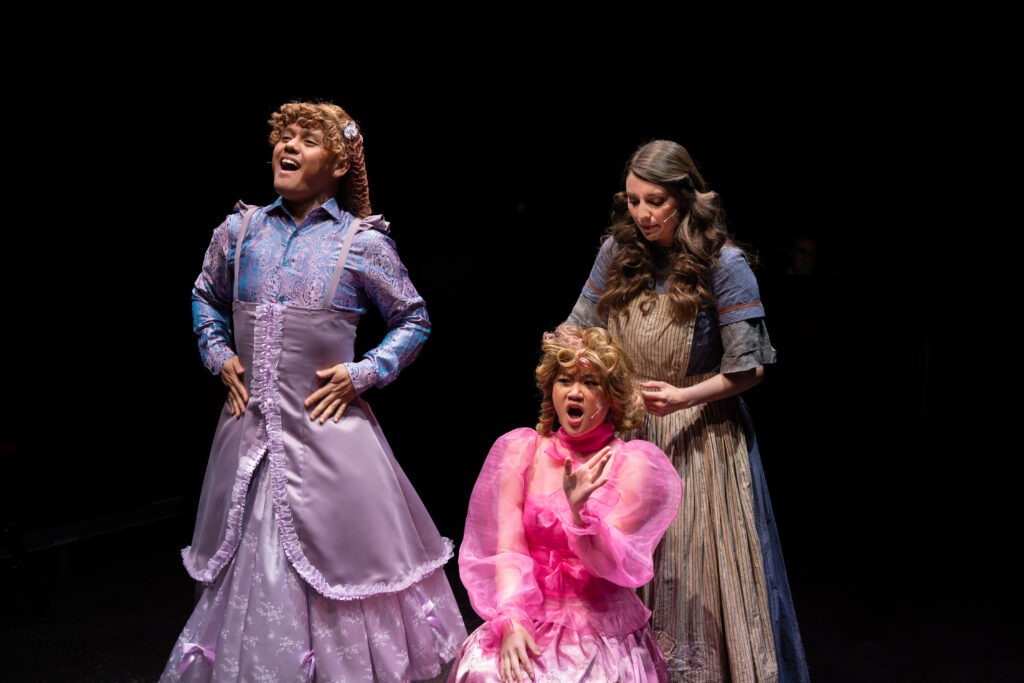
The characters are based on Brothers Grimm and Charles Perrault’s literary works, but they are molded by the performers to convey consequences from their less-than-ideal actions and impulsive decisions. No Disney aberrations here. Director Robert Quinlan focused on the storytelling, and he doesn’t waste a moment – no dilly-dallying whatsoever.
The format: the narrator exclaims “Once upon a time,” and we’re off on an adventure with four groups of characters – Cinderella wishes to go to the king’s festival, Jack wishes his cow Milky White would give milk, a baker and his wife wish to have a child, and Little Red Ridinghood wishes for bread to bring to her grandmother.
Be careful what you wish for – and soon we’ll know about curses. A witch convinces the childless couple that if they bring her four ingredients: “the cow as white as milk, the cape as red as blood, the hair as yellow as corn, and the slipper as pure as gold” – in three days’ time, she will reverse the infertility curse.
Thus commences a long and winding path through the woods.
It’s the largest musical ever staged in the intimate Wool Studio Theatre, but only 11 actors are playing the 20-plus characters, with a few puppets too. And with scenes taking place in and around the audience, characters are right in the mix.
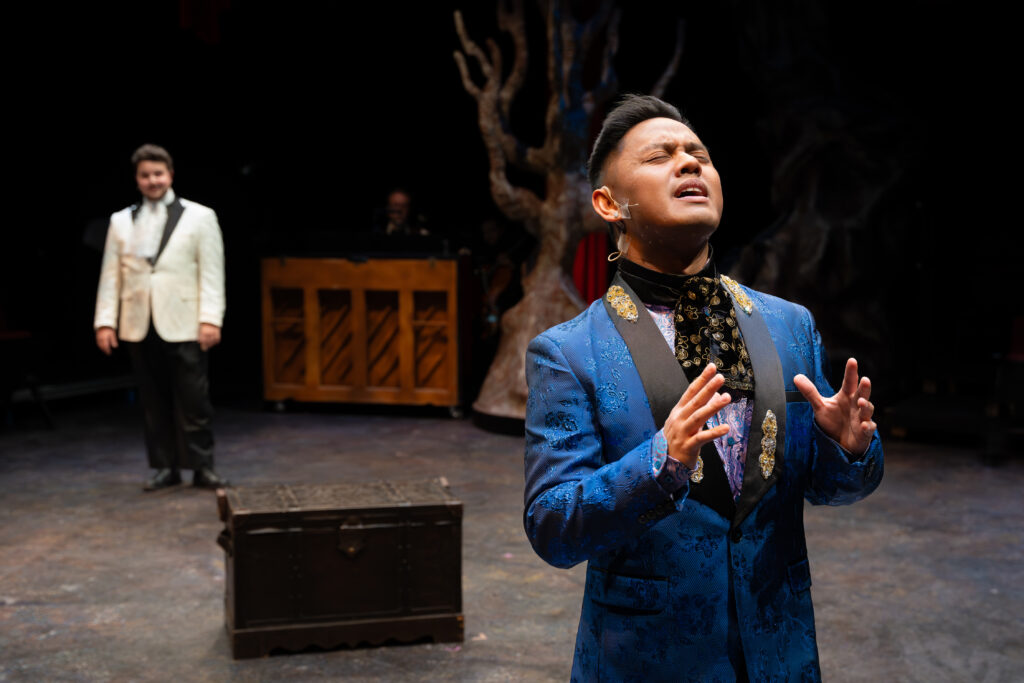
The cast truly gets a workout, setting the scenes and popping in and out, often relying on quick costume changes. They are marvels in motion.
Phil Leveling is outstanding, and one of the MVPs – he smoothly switches into the Wolf, Mysterious Man and Cinderella’s Stepmother without missing a beat. Cinderella’s Prince Matt Billings is also puppeteer for Milky White, another fluid transition. He works well with Kevin Corpuz as Rapunzel’s Prince, and their full-bodied “Agony” duet is a highlight. The nimble Corpuz doubles as Lucinda, one of the stepsisters too.
Molly Wennstrom soars as the Baker’s Wife, a role she’s well-suited for, and “Moments in the Woods” is terrific. She and her scene partner, Kevin O’Brien as the Baker, are splendid together, especially in “It Takes Two.” O’Brien is a versatile musical theater performer, and not only are they both strong in song, but also have the emotional heft to depict their rocky relationship.
O’Brien and Leveling are also dynamic in “No More,” bringing considerable depth to their version.
Kristen Joy Lintvedt makes an impressive debut as Cinderella, delivering lush vocals and putting some oomph and a little edge into the role.
Aliyah Jacobs opts for a trusting Little Red and sweet-voiced Sarah Wilkinson exemplifies a girl trapped in a gilded cage as Rapunzel, and also has fun as Florinda. Matthew Cox is both an innocent, naïve Jack, and the more obnoxious Steward.
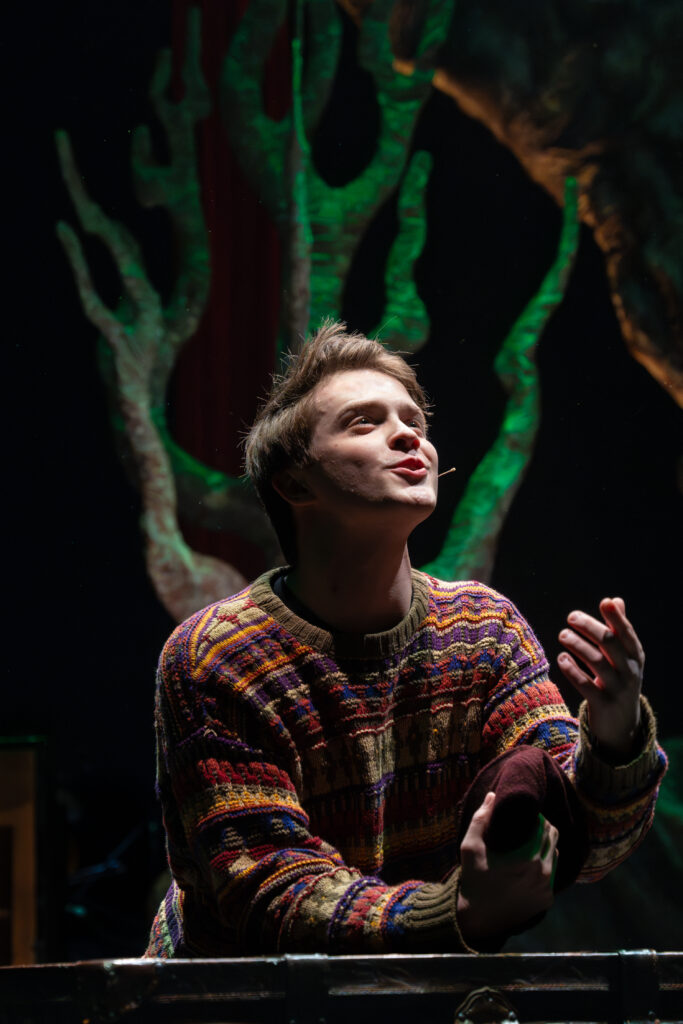
Sarah Gene Dowling plays the Witch robustly as cruel and condescending, unforgiving of anyone’s flaws – except her own. As bitter as she is, when she is rejected, and crestfallen, her “I was just trying to be a good mother” is said with transparent desperation.
Victoria Pines is cranky and intolerant as Jack’s Mother, not giving any hints of humor, which always helps the passive-aggressive dialogue be more palatable.
Nisi Sturgis lends her considerable talents as the booming voice of the Giant (well, Giantess).
The group vocals stand out. The grown-up tale needs performers to bring out the complexities confronting each character, for everyone changes. No one is left unscathed.
Quinlan has done a masterful job of keeping things briskly paced. He aims for the sweet spot in tone – hopeful in the first act and rueful in the second. Perhaps a bit more whimsy with the necessary dark undercurrent, but I think they were so focused on crisp movements and infusing sincere emotion into each song, that no one let up for a second. Choreographer Ellen Isom kept the moves playful.
NJT’s in-house costume designer, Michele Friedman Siler, adroitly outfitted every character to support both the storytelling and the fast changes that the in-the-round setting demanded.
C. Otis Sweeney’s scenic design is exceptional – and enhanced by Jayson Lawshee’s lighting design, and not just the trees were awe-inspiring, but that full moon too. Amanda Werre’s skilled sound design was effective in the atmospheric woodland sounds and also by indicating danger in giant footsteps — and punctuating dashed hopes and dreams, and broken hearts.
Since its Broadway opening in 1987, there have been productions in London’s West End, national tours, Hollywood Bowl, The Muny, three revivals and a 2014 film adaptation. This fresh New Jewish staging can stand as one of the most heartfelt in the region. The melodies linger, the performers enchant, and the themes are re-awakened, stored for safe-keeping in my memories.
New Jewish Theatre presents “Into the Woods” from Nov. 30 to Dec. 17 at the J’s Wool Studio Theatre, 2 Millstone Campus Drive, St. Louis, MO 63146. Performances are Thursdays at 7:30 p.m., Saturdays at 2 and 8 p.m., and Sundays at 2 p.m. (Closing show on Dec. 17 has sold out).
Individual tickets are $27- $58 with special rates available for groups. Tickets are available by phone at 314.442.3283 or online at newjewishtheatre.org
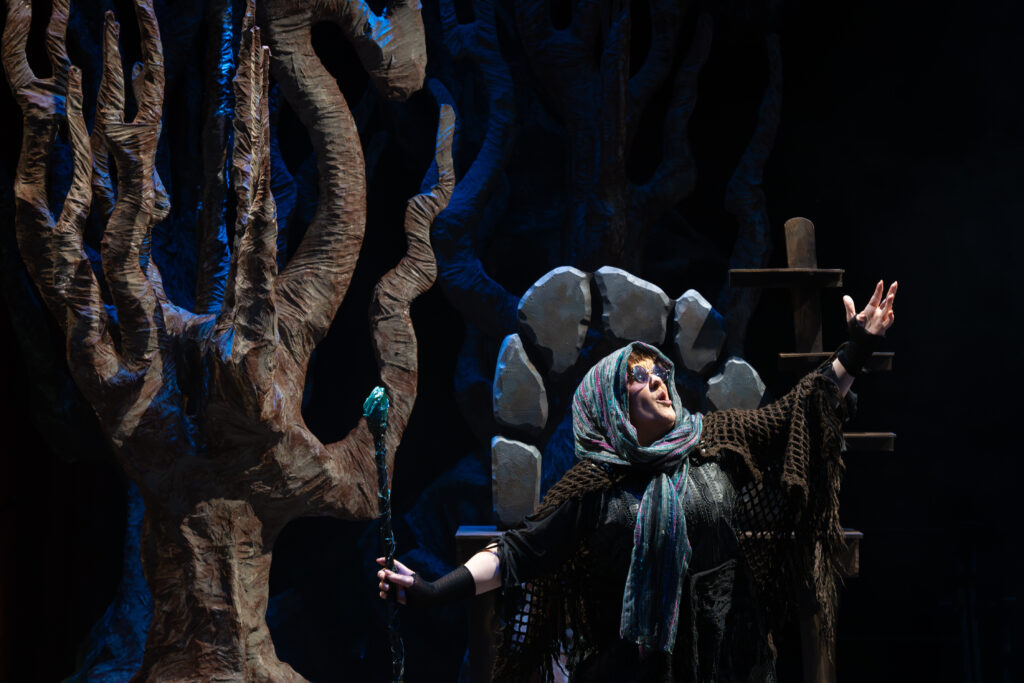
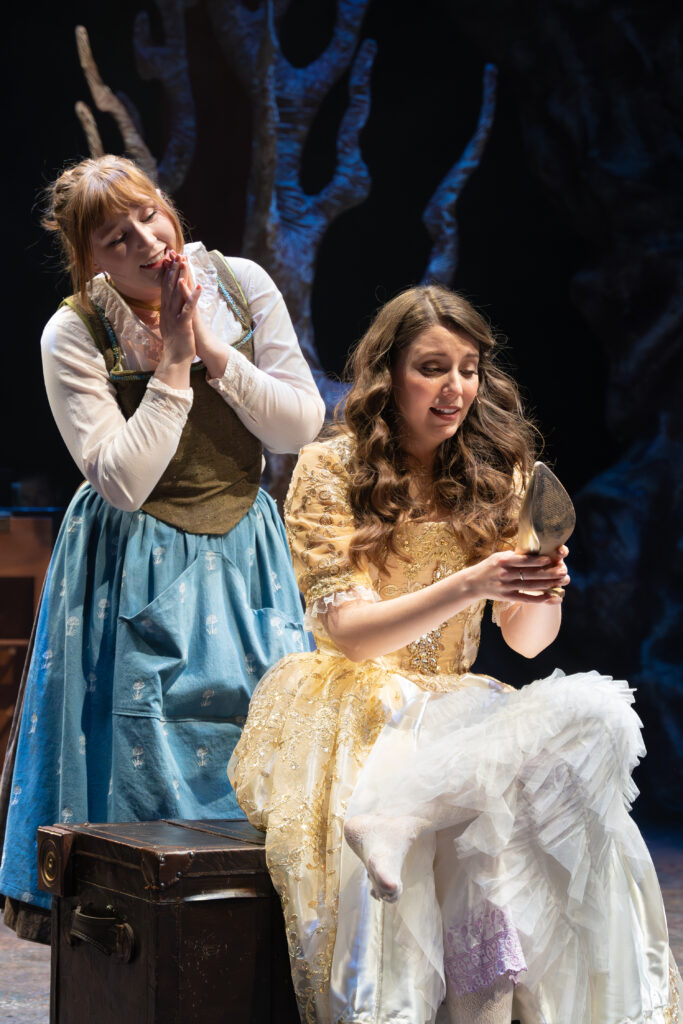

Lynn (Zipfel) Venhaus has had a continuous byline in St. Louis metro region publications since 1978. She writes features and news for Belleville News-Democrat and contributes to St. Louis magazine and other publications.
She is a Rotten Tomatoes-approved film critic, currently reviews films for Webster-Kirkwood Times and KTRS Radio, covers entertainment for PopLifeSTL.com and co-hosts podcast PopLifeSTL.com…Presents.
She is a member of Critics Choice Association, where she serves on the women’s and marketing committees; Alliance of Women Film Journalists; and on the board of the St. Louis Film Critics Association. She is a founding and board member of the St. Louis Theater Circle.
She is retired from teaching journalism/media as an adjunct college instructor.

